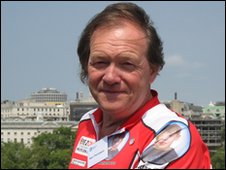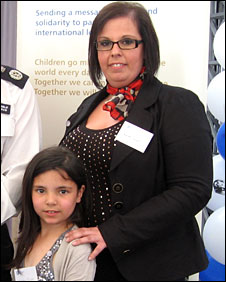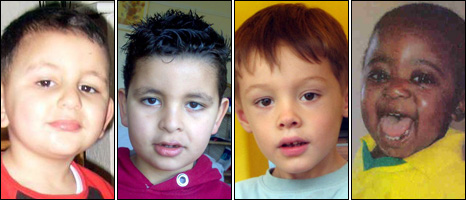|
What unites the children pictured above is
not their favourite football team or toy, it is the fact they have been
abducted by a parent.
And what unites their left-behind parents is
that their lives have been turned upside down - their universe now
revolves around getting their children back.
They stand together on a sunny Tuesday
morning at the National Theatre in London, where they have gathered to
mark
International Missing Children's Day.
The focus this year was parental abduction,
and the day was also used to re-launch the UK's Child Rescue Alert, a
system which notifies the public of a child abduction via the media
within the first few crucial hours.
It was easy to spot the parents - they were
the red-eyed ones, dabbing away the tears as they relived their
nightmares.
The most recognisable face at the event by
far was
Kate
McCann's, whose daughter
Madeleine
disappeared from their
holiday
apartment
in Portugal in 2007.
But the bike-wheeling Australian Ken Thompson
also stood out, as did the smiling face of his son Andrew, emblazoned
across his lycra outfit.
'Completely disempowered'
Andrew was just three when his mother Melinda
took him aboard a flight to Frankfurt with no intention of returning
home. It is thought they may be in the UK, or possibly Germany or Spain.
Mr Thompson last saw his son on the 22 April
2008 - two days before he was abducted.
His wife had made unfounded allegations
against him and during their family court wrangling, she saw a
psychiatric report which concluded she was mentally unwell.
 |
|
It's up to me to prove where Andrew is... |
On the day he realised they had gone, Mr
Thompson - a former deputy fire commissioner in New South Wales - went
from being powerful to powerless.
"I felt completely disempowered. I was put in
touch with an international lawyer who told me to give it three to six
weeks but I knew my wife did not fit the profile of a parent who abducts
a child," he said.
"Normally they want to go back to the country
they came from but my wife was born in Australia."
He said it took months for the Australian
authorities to spring into action, and although he has "tried
everything", from Interpol to Facebook, it appears his wife and son have
"completely vanished off the face of the earth".
So Mr Thompson left his job and is cycling
around the UK and Europe to raise awareness of his son.
"One of the most frustrating things is that
the media is keen to talk about a child that has been abducted from
their country but not one that might have been taken to their country,"
he said.
He believes in the six degrees of separation
theory and that "someone, somewhere knows something".
Mental picture
Mr Thompson talked about how multicultural
marriages, ineffective legislation, and cheap airfares had all impacted
on parental abduction.
But he said the key was the 1980 Hague
convention on international child abduction, which aimed to ensure
children's safe return to the country where they normally lived.
Under the agreement, issues of residence and
contact are then decided by the courts of that country.
But Mr Thompson said it had fallen behind the
times.
It took a long
while for me to realise that if
I wanted him back, it was going
to take a big fight
|
"The borders are a lot looser than they were
30 years ago," he said.
"It's up to me to prove where Andrew is and
if you can't, the people who administer the Hague convention find it
hard to help."
The
Hague is on his cycle route and while there, he will deliver a
letter on behalf of all left-behind parents.
What keeps the pedals turning for Mr Thompson
is a mental picture of Andrew with a huge smile of his face, saying: "I
want to come and live with you".
'Trauma'
Blessing Mlandeli knows all about slow,
protracted legal processes. The 36-year-old's son Tevin, aged just two,
was taken by his father to Zimbabwe in July 2007.
"Even when it had sunk in that he had left
the country, I still thought I would have him back in a month," said Ms
Mlandeli.
 |
You have to
carry on. You have to fight.
No-one has the right to take
away your child
|
I didn't realise how complicated it was going
to be. It took a long while for me to realise that if I wanted him back,
it was going to take a big fight."
In addition to the usual red tape, her case
is complicated by immigration issues and relations between the UK and
Zimbabwe, which has not signed up to the Hague convention.
Ms Mlandeli, a support worker, did not have
any contact with her son for a year but she now has custody, and he is
living with her sister in Zimbabwe's capital Harare.
She hopes he will soon have the relevant
documentation to travel back to the UK.
While her son is in good physical health, she
said his education had suffered from the "trauma".
"He cannot read and cannot write properly and
his language skills are underdeveloped," she said. "He was taken away at
the age of two and that's a crucial time."
Face of hope
Other left-behind parents at the event
included Dr Yusra Abo Hamed and Ken Spooner.
Dr Abo Hamed's two young sons - Sami and Rami
- were taken to Syria by their father in December 2008, and Mr Spooner's
two boys are in Zambia with their mother.
His partner took Devlan and Caelan on a
holiday to visit her parents but never returned.
 |
Mr Spooner thought his
sons were going on holiday to Zambia
|
The kitchen fitter said getting his sons back
was now "his life" and he was lucky he had savings to fund his legal
battles and travel costs.
"I'm very bitter but I know she's my
children's mother and I would like to think there will be a time that my
children will be back home and they can enjoy both parents," he said.
Nadia Fawzi was a smiling ray of hope for the
parents at the National Theatre.
The six-year-old was abducted by her father
when she was four and taken to Libya.
Her mother Sarah Taylor moved to the North
African country and eventually won custody, but it took involvement at
the highest level from Gordon Brown and the Libyan leader Colonel
Gaddafi.
Ms Taylor reassured the left-behind parents
that their children would never forget them.
"It took two and a half years for me to get
my hands on my daughter again. When it's your child you find the
strength from somewhere," she said.
"You have to carry on. You have to fight.
No-one has the right to take away your child." |





